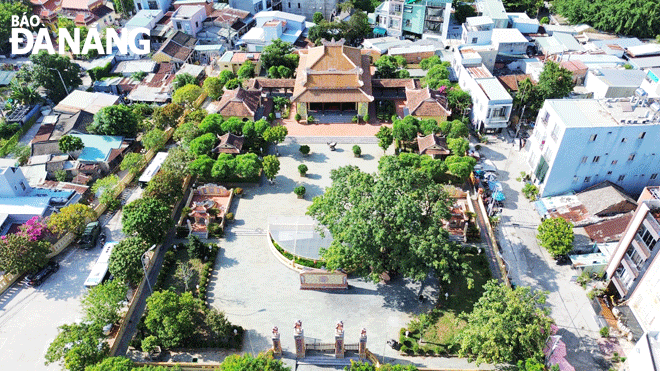Recently, the Da Nang administration has given the green light to the construction of a park west of Thoai Ngoc Hau Temple in An Hai Tay Ward, Son Tra District on the occasion of the 194th death anniversary of the talented Vietnamese General Nguyen Van Thoai, also known as Thoai Ngoc Hau. This is good news for the residents in An Hai, and Da Nang at large, in recognition of the significant contributions made by the once-illustrious general in the feudal Nguyen Dynasty.

The Da Nang administration has recently approved the construction of a park to the west of Thoai Ngoc Hau Temple at a total amount of nearly VND71 billion.
Thoai Ngoc Hau’s real name is Nguyen Van Thoai. He was born on 26 November 1761 in An Hai Village, Dien Ban District, Quang Nam Province (now called An Hai Tay Ward, Son Tra District, Da Nang). He has always been highly praised and respected for his creativeness in reclaiming land, founding villages, and promoting economic development and border protection.
The legendary mandarin was one of the meritorious officials during the reign of Emperor Gia Long of the Nguyen Dynasty. In 1777, he and his mother moved to the South. Then, he joined the army under Lord Nguyen Anh, and was awarded the title of Thoai Ngoc Hau.
In 1818, he directed militiamen to dig Thoai Ha Canal in Long Xuyen (now known as An Giang Province in southern Viet Nam), the first flood drainage work in the Mekong Delta. Between 1819 and 1824, following the direction from King Minh Mang, he instructed the digging of a canal connecting Chau Doc with Ha Tien, bringing great efficiency in the irrigation and border defence for not only Hau Giang but also the whole country.
With glorious merit, he still wholeheartedly looked up to his homeland and paid special heed to taking care of the people's lives there. In 1827, he made great contributions to re-establishing the An Hai Market as per the wishes of An Hai villagers in his hometown and those in the neighbouring villages of My Khe, Hoa Khue, My Thi, Phuoc Truong, Tan An and Nam An on the eastern bank of the Han River.
During his stay in An Hai Village, he directed the construction of the Ha Than Market, the An Phuoc Pagoda and the An Hai Temple, along with made appeals for donations from the general public to restore worshipping houses for ancestors. He passed away on June 6, 1829, and was buried in Chau Doc, An Giang Province.
The late General’s cultural and spiritual heritage has been passed down through many generations, especially his spirit of hard-work, special emotional attachment to his hometown, creative thinking, and kindness.
According to Vice Chairman of Son Tra District People's Committee Huynh Van Hung, An Hai Ancestors and Thoai Ngoc Hau Temple was recognised as a national historical and cultural relic by the Vietnamese Ministry of Culture, Sports and Tourism in 2007.
Recently, the Da Nang administration has approved the construction of a park to the west of Thoai Ngoc Hau Temple at a total amount of nearly VND71 billion.
Specifically, under the project, focus will be on formming a cluster of landscape parks, walking gardens combined with parking lots, and public utilities so as to serve the needs of entertainment and improve the cultural and spiritual life of the people and tourists as well, and at the same time combining with Thoai Ngoc Hau Temple to form a cluster of cultural and historical highlights in the city.
As a special feature, there will be a transparent water surface design in the East - West direction to simulate Vinh Te Canal as a way to honour the contributions made by Thoai Ngoc Hau. Crossing the canal is a small bridge located to the east, connecting the two banks of landscape with different architectural styles and spaces.
Also noticeably, there will be a relief depicting the biography, life, career and merits of this famous general.
The whole project is scheduled to be completed by the end of 2025.
Le Ha, an elderly person living on Ha Than Street, near the An Hai Ancestors Temple, said, “We hope the project will be completed soon so that a new attraction can make its debut for residents and visitors, thereby commemorating the merits of the predecessors who had the merit of exploring new land for the establishment of villages. Also, it is an opportunity for people to focus on traditional cultural and spiritual values in order to preserve and promote the national cultural heritage.”
Reporting by Diep Nhu - Translating by A.Thu